- Home
- Jason Pinter
The Mark Page 21
The Mark Read online
Page 21
“Well, 105th and Broadway, just like you asked. Now, would it be too much trouble to ask for some cash? Or would you rather just fall asleep again?”
I fished in my wallet and pulled out a crinkled ten. Amanda added a five.
“I’m sorry,” I said, the emotion genuine. “Really, you’re a lifesaver. It’s been a hell of a week.” Mitch nodded, picked at a hangnail.
“Right, sure. Well, listen, take care, guys. It was nice to meet you both in the eight seconds before you started drooling.” He extended his hand. I shook it. So did Amanda.
“Take care, Mitch.”
“Will do,” he said. “Be careful up here. I don’t like this neighborhood much. Always feels like something bad is about to happen.”
“I know what you mean.”
We waved as he drove off, flashing his blinker and disappearing into the night. Then we were alone.
The building stood in front of us like some vast gothic tenement. The last time I was here, nearly three days ago, I was almost killed. My life changed forever. What was once a run-of-the-mill apartment complex had taken over my nightmares.
Welcome home, Henry.
There didn’t seem to be any police activity, just a homeless man staggering around by the building’s entrance. He looked drunk, uninterested in us. I hoped looks weren’t deceiving, and he wasn’t an undercover cop. Paranoia came pretty easy when you’d been shot and hunted.
Moonlight bathed the street, and a chilled wind blew through the city.
“So what now?” Amanda asked.
“Now,” I said, “we see what Grady Larkin knows. It’s a good thing you’re in the market for a new apartment.” I explained what I had in mind.
I squeezed Amanda’s hand as we approached the front door, then pressed the buzzer for Grady Larkin’s apartment. A scratchy voice answered.
“Yeah?”
Amanda said, “Hello? I’m trying to reach the super? I need to lease an apartment and, well, I hope it’s not too late, but I’m getting desperate and I heard from a friend that you have some vacancies.”
“Are you shittin’ me, lady? You know what time it is? Office closed like four hours ago.”
“No, I’m not shitting anyone. Please?” She ad-libbed, “My boyfriend just dumped me and I have nowhere to stay.”
There was an exasperated sigh on the other end, then the buzzer rang and the door unlocked.
The lobby was cold, quiet. Not the quiet of mourning, the quiet of fear. Our steps echoed through the hallway. We were trespassing on dangerous ground, and the building seemed anxious to protest.
We took the stairs down to the basement. The tiling looked bright, fresh-scrubbed. Larkin must have cleaned up after the police had left the crime scene. A complete one-eighty from the grimy textures last time I was here.
We arrived at apartment B1. I looked at Amanda, mouthed the words thank you.
You’re welcome, she returned.
I took the thick black marker out of my pocket, purchased at Union Station for ninety-nine cents, and placed it on the floor by the doorjamb.
I stepped around the corner, out of view of Larkin’s apartment. I felt steam on the back of my neck from the nearby boiler room. Wiping sweat from my eyes, I heard Amanda knock on the door.
I heard the creak of hinges that hadn’t seen WD-40 in many moons, then a throaty voice said, “So you need an apartment?”
“Yeah, um, my friend said he heard about a few vacancies here, and I was hoping I could look at whatever’s available. I’m in the market to lease, like, ASAP.” Her voice was girlish and naive, like a child asking for a cookie and expecting a slap on the wrist. Grady Larkin cleared what sounded like a pint of phlegm from his throat.
“You say your boyfriend dumped you?” I could almost picture Larkin leaning against the doorframe trying to sound seductive, arms folded as he pushed out his biceps. Amanda must have been trying pretty hard not to laugh.
“Yeah. Can you believe it?”
“No, I definitely can’t. Stupid prick.” I could almost sense his eyes feeling her up, and it made my skin crawl.
“I got a few openings, maybe a few more’ll open up soon. Had a few, how you say, incidents here recently.”
“Oh, yeah?” Amanda said. “What kind of incidents?”
“S’not important,” Larkin replied. “But I think I can fix you up.”
During our journey I’d grown protective over Amanda, despite the inherent irony. Since we’d met, she’d done nothing but help me survive, risking her life and future in the process. She believed in me. I only hoped I deserved it. And it hurt like hell to stand in the shadows while a creep like Larkin tried to play the young Marlon Brando.
“So let me see here,” Larkin said. I heard the rustling of papers. “I got an apartment just opened up on the fourth floor and another one on the first that’ll be available at the end of the month.”
“Do they have cable and Internet access?”
“They have anything you want,” he said, a sly tone to his voice. “Come, let’s have a look-see.”
I heard the stairwell door open, footsteps ringing on the steps, voices fading away. I waited, praying the trick would work. After a moment I heard a soft thud. That was my cue.
I held my breath as I stepped around the corner. I exhaled when I saw the plan had worked. As Larkin opened the door, Amanda had subtly wedged the marker between the door and the doorframe, preventing the lock from catching. They were in the stairwell before Larkin had a chance to notice. I pocketed the marker and slipped inside Grady Larkin’s apartment.
The home was dark, stale, and smelled like I was trapped inside a filthy ashtray. There was a small bedroom in the back, brown sheets thrown haphazardly across the bed. A worn paperback book lay on the floor. A picture of a heavyset woman holding two small children stood on a nightstand. The woman’s smile looked authentic, joyous. Larkin’s mother, no doubt. I bet she was really proud of her son.
A dirty old computer sat on the desk. Above it hung a calendar of half-naked women posed on a motorcycle next to—were my eyes deceiving me?—G. Gordon Liddy. Something told me Larkin didn’t throw many parties.
A steady hum came from a large copier in the corner. A rusty gray filing cabinet caught my eye, each drawer with dates in chronological order.
I pulled out the top drawer and found a shockingly neat collection of files, organized by tenant and month, dating back to 1999. Opening this year’s “May” file, I found a copy of Luis Guzman’s most recent rent check, made out to Grady Larkin. Sixteen hundred dollars my ass, that fucking liar.
Luis Guzman’s most recent rent check was for a measly three hundred dollars. Either someone else was subsidizing his rent, or Luis Guzman would never find a career as an accountant.
Three hundred dollars for a month’s rent in Manhattan for a two-bedroom apartment. Not only was that uncommonly low, it was impossible.
My fingers flew through the entire file. I found twenty more checks written by Luis Guzman, all addressed to Grady Larkin. As I went farther and farther back in the file, I realized this was more than an anomaly, but it actually had a precedent.
Contrary to everyone else who’d ever lived in New York, Luis and Christine Guzman’s rent had actually decreased over the years. The oldest check was dated January 1999. It was for six hundred dollars. Double what they were paying now, but still extraordinarily cheap by Manhattan standards. In January 2002, their rent dropped to $525, and then again to $450 in May 2003. Since January of 2004, they’d been paying just $300 per month. Thirty-six hundred dollars a year.
I should have looked harder before signing my lease.
I made a copy of the first check of each payment period and stuffed them in my pocket. I searched other tenant files to see if the theme held. Unsurprisingly, it did. I pulled out a check signed by one Alex Reed, dated February 2001 for four hundred dollars. In the memo area, it read Rent: Apt. 3B. One from October 2005 was for three-fifty. Alex Reed’s rent had s
teadily decreased the longer he lived in the building. Just like the Guzmans’.
It didn’t make sense. Lots of New York apartments were rent-stabilized, but I’d never heard of rent-descending. There had to be a reason for it.
I pulled out every file I could, and in the next five minutes I discovered that there were no fewer than ten residents of 2937 Broadway whose rent had declined sharply the longer they remained under contract. Even more surprising, though, was that there were many tenants whose payments increased over the same period.
Something was definitely wrong.
Half the building was paying less than when they moved in, and the other half was paying more. I separated the checks where the rent had gone down and made copies. Soon my pockets were bulging, the copier’s hiss steady and unceasing.
As I went to close the filing cabinet, one more folder caught my eye. It was labeled Payments—outgoing.
I opened it.
Inside I found checks written by Grady Larkin made out to various contractors. Exterminators. Electricians. Plumbers. Dozens to Domino’s Pizza. And each month, like clockwork, one large check was made out to a man named Angelo Pineiro for between twenty and thirty thousand dollars. For some reason, Angelo Pineiro’s name stuck in my head. I’d heard it before.
Then I heard a sound that made my heart skip a beat.
A steady pounding coming from the hallway. Footsteps. Voices growing louder.
Amanda. Grady. They were coming downstairs.
I thrust the last few checks into the copier, listening to the hum as it churned out carbons. When each one was ejected, I placed it neatly back in the filing cabinet. Sweat poured down my face. Their voices grew louder, as did the sound of feet echoing on metal.
I put one last check in the copier and pressed Start. The machine sucked the paper in, but instead of shooting out the original, all that came out was a sharp beeping noise. I looked at the LCD display.
In bold, blinking letters, it read Paper Jam.
Oh, God. Not now…
Frantically I opened the copier’s lid, hoping the original would be there. No dice. It was stuck somewhere inside the machine. I’d never been particularly savvy when it came to heavy machinery, and had no desire to go rooting around in the belly of some demonic steel beast, but I couldn’t leave any trace that someone had been in Larkin’s office. The LCD display instructed me to remove the middle portion from the copier to facilitate paper removal. Whatever the hell that meant.
The voices grew louder.
I pulled at a plastic tab that resembled the one blinking on the display. To my surprise, a shelf slid out effortlessly. Turning a mysterious green dial counterclockwise, I heard the sound of paper crinkling. Hopefully it wasn’t the original.
I kept turning the dial, and the tattered edge of a piece of paper peeked out of a thin slit. Turning the dial faster, I pulled at the page. It was a copy of the check. The original was still somewhere inside.
I pulled harder, horror sweeping through me as half the page tore off in my hand. I spun the dial faster, and the rest of the page came out. I pushed the compartment back in and heard a faint whirring noise. The original check, flat and perfectly preserved, came spitting out of the feeder. I thrust it back into the cabinet, shut the file and bolted out of Larkin’s apartment, the torn page crumpled in my hand.
Just as I rounded the corner, the stairwell door banged open and footsteps came to a halt in front of Larkin’s apartment.
“So you’ll let me know about 4A, right? I got three other buyers. Maybe if you give me a deposit tonight I’ll be able to hold it for you.”
“Actually, I’d like to talk it over with my husband before I commit.”
“Your husband? I thought you said your boyfriend just dumped you. I don’t see no ring.” Amanda gave a high, airy laugh. I took slow, deep breaths, oxygen flowing through my parched lungs.
“I don’t wear my ring. And my boyfriend did dump me,” Amanda said. “Our love is based on the spiritual, not the material. And who are you to judge my personal choices?”
“Right, whatever,” Larkin said. “So listen, I’ll hold it for you till tomorrow. After that, I’m not making any promises.”
“So then I’ll call you tomorrow. I can let myself out.”
“You do that.”
There was a loud squeak as Larkin’s door opened, a satisfying clunk as the lock hit home. I waited a moment, then stepped around the corner. Amanda was smiling. A quick nod and we headed up the stairs and out of the building. My pulse was racing, my neck, my wrists, my hands, my whole body tense with this new information.
We crossed the street and stood in the safety of a nearby bus shelter.
“So, what’d you get?” she asked.
I pulled the copied pages out and showed her, explaining the payment inconsistencies over the years. She looked puzzled, shuffling through the various checks like a student who couldn’t understand why she only received an A minus.
“So what does all this mean? What do we do with these checks?” Her eyes were expectant. Fortunately I’d thought about our next move while still inside Larkin’s apartment. I knew exactly what to do.
“We need to find out who these tenants are, what they all have in common and why Grady Larkin is the greatest landlord in Manhattan. Somebody is subsidizing the rent, but for only select tenants,” I said. “We need someone who can get some dirt fast, and get it without making any noise. And I know the perfect guy to do it.”
33
D usk had settled over New York, a dim blue-black that seemed to mirror everything I felt on the inside. Weariness had crept over me like a cold front, and there was no shelter in sight. The man who’d wanted to kill me back in St. Louis, he wasn’t a cop. The cops wanted me dead for killing one of their own. But this man was a deadly mystery. I still didn’t know what he was looking for or what was in that package, but unless he was dead he likely hadn’t abandoned his quest. And a man like that didn’t die easy.
I’d been lucky to escape New York the first time. Lightning wouldn’t strike twice. The truth was buried here, and it would have to be uncovered soon.
I changed a dollar at a local grocery store, trying not to stare at the newspapers stacked up like tinder on the metal rack. On the cover of the early bird edition of the Gazette was another column by Paulina Cole. The headline read Henry Parker: A Villain For Our Times, Or Of Our Times?
Incredible. Somehow I’d managed to buck the trend. In this city, unless you were a celebrity with visible cellulite or a politician having a homosexual affair with the pool boy, you didn’t get hero-of-the-day treatment for more than twenty-four hours.
Not exactly the kind of story I hoped to hinge my reputation on. For years I’d dreamt about being featured on the front page of the New York papers. And now here was my dream, in full black and white.
“You okay?” Amanda asked, as a kindly man with a brown turban handed me two quarters, two dimes and six nickels.
“Yeah, it’s just…” I stopped, my head falling to my chest. “I want this to be over. I want my life back. I want you to have your life back.”
“We will,” Amanda said, gently placing her hand on my arm. She was trying to comfort me, but unease soiled her voice. She knew how perilous the situation was, that at any moment I could be cuffed and thrown in prison. Or worse.
We stepped into a phone booth a few blocks down. An elderly man sat on a stoop sucking on a pipe, watching me. He took in a lungful and exhaled a plume of white smoke. His eyes refused to let go of mine.
I took the bundle of papers from my pocket and dialed the number I knew by heart. This is what it came down to. This one phone call.
It could reaffirm everything I believed in, or dash my hopes in one fell swoop. If he was true to his word, if he really did believe in me that day, this was when he’d show it. He had to. Or everything I’d ever believed in was dead.
The line picked up after just one ring. The familiar greeting sent a chill down my
spine.
“New York Gazette, how may I direct your call?” Amanda looked at me, her grip on my arm tightening.
I took a deep breath.
“Jack O’Donnell, please.”
“May I tell him who’s calling?”
“His husband.”
“His…what?”
“Just connect me.”
O’Donnell picked up the phone before the first ring had ended.
The last time I heard that voice, it was giving me a chance to prove myself. But I’d thrown it away, burned it and pissed on its ashes. I only hoped he was really on the level.
“This is O’Donnell.”
“Jack?”
“Speaking.”
“Jack,” I said, my voice trembling, my throat choking up. “It’s Henry Parker.”
A few seconds passed.
“No, I’m sorry. Henry Parker doesn’t work here anymore.”
My stomach lurched and suddenly I felt queasy. Jack had confirmed my fears. The Gazette had officially fired me.
It was all gone. My career was over. Even if I made it through this alive, I had nowhere to go.
“No, Jack. This is Henry Parker.”
There was silence on the other end.
Right when I thought he’d hung up, O’Donnell said, “So let me guess, Mr. Parker. You’re calling to confess your sins, right? And you’d also like a front-page column, a nice book deal and the chance to direct the movie based on your life. The whole Unabomber deal, right?”
“No, Jack, I…”
“Save it. You’re the fourth Henry Parker to call today. You guys really don’t have an original thought in your head, do you?”
My brain raced at warp speed. I had to convince him. Suddenly everything came pouring out in a geyser.
“You gave me the assignment to interview Luis Guzman. Wallace had me writing obituaries, but you took it upon yourself to give me a chance. I pass by your desk every day. I sit next to Paulina. Wallace has a miniature American flag on his desk, next to a photo of his wife. The office smells like roasted peanuts during the day and like deodorant at night. I know that you’re always the first one in and last one to leave and your chair has a pink bubblegum stain on the right arm.”

 Hide Away (A Rachel Marin Thriller)
Hide Away (A Rachel Marin Thriller)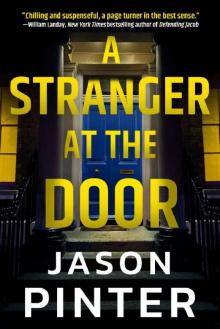 A Stranger at the Door (A Rachel Marin Thriller)
A Stranger at the Door (A Rachel Marin Thriller)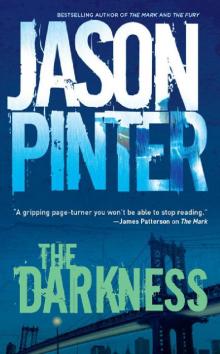 The Darkness hp-5
The Darkness hp-5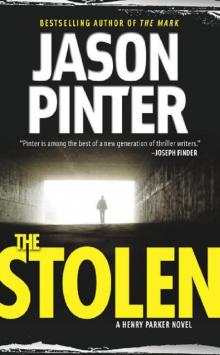 The Stolen hp-3
The Stolen hp-3 The Guilty hp-2
The Guilty hp-2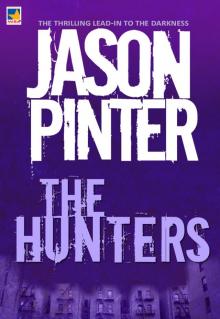 The Hunters
The Hunters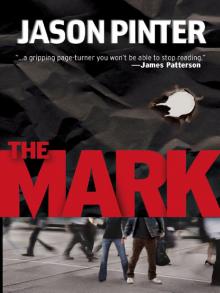 The Mark hp-1
The Mark hp-1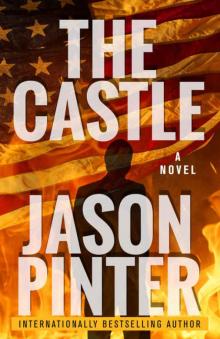 The Castle: A Ripped-From-The-Headlines Thriller
The Castle: A Ripped-From-The-Headlines Thriller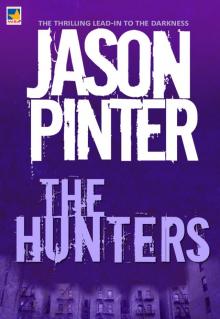 The Hunters (henry parker)
The Hunters (henry parker)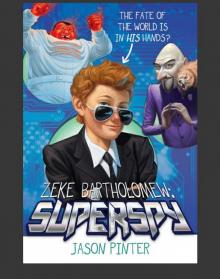 Zeke Bartholomew
Zeke Bartholomew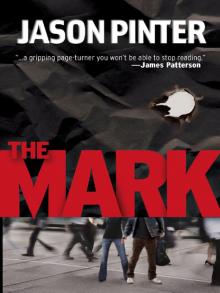 The Mark
The Mark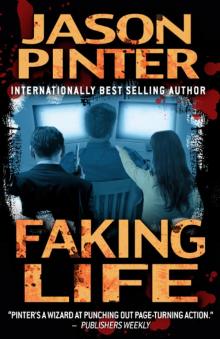 Faking Life
Faking Life![[Henry Parker 01.0] The Mark Read online](http://i1.bookreadfree.com/i2/04/08/henry_parker_01_0_the_mark_preview.jpg) [Henry Parker 01.0] The Mark
[Henry Parker 01.0] The Mark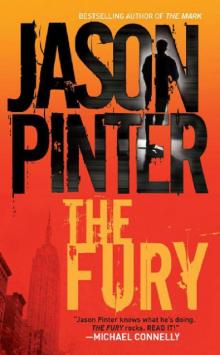 The Fury hp-4
The Fury hp-4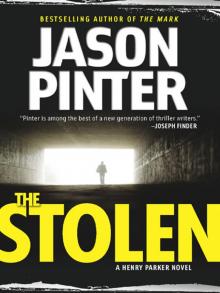 The Stolen
The Stolen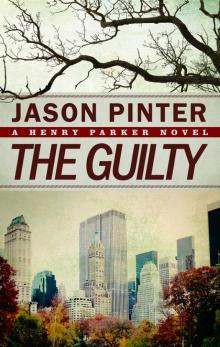 The Guilty
The Guilty